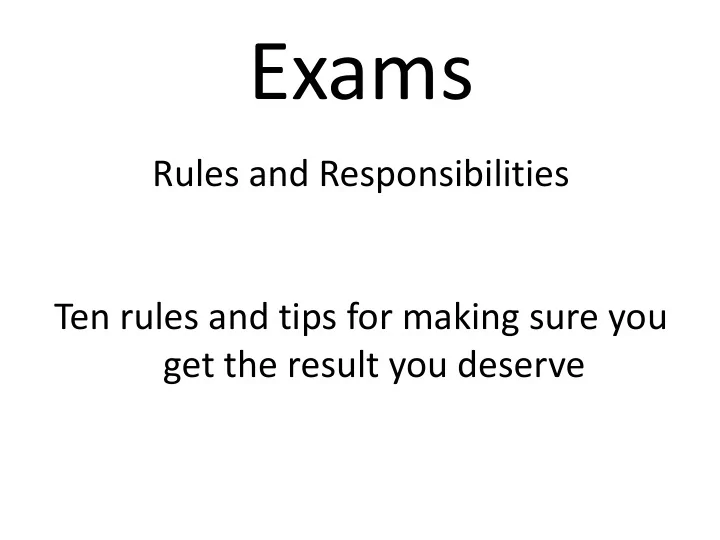

Exams Rules and Responsibilities Ten rules and tips for making sure you get the result you deserve
During an exam you will be subject to the rules of your school or college, and also to the rules of the Joint Council for Qualifications (JCQ). There are written rules about what pupils, Invigilators, Exams Officers, Teachers and Head Teachers must do, and what they must not do in Exams. These rules are designed to make it fair for everyone doing exams across the UK, and to make sure that problems can be avoided or followed up afterwards. Everyone is covered by these rules – lets see what you should know about exams…………
Number 1 - Turn up on time Check your exam timetables properly…..last year some pupils turned up on the wrong day! Make sure you have a phone number for the school in case of problems. If you turn up late, the Exam Board may not mark your paper even if you finished it.
Number 2 - Let someone know if you have a medical problem before the start Injuries could slow you down – you may be given help to write, or extra time in the exam A constant cough or sneezing could disturb others – you may be moved to another room
Number 3 - Make sure you bring the correct equipment • Only use black ballpoint or fountain pens. No gel pens are allowed, even black ones. • Pencils may be used if it says so on the paper. No ‘ Tippex ’, • See-through pencil cases are the only ones you can bring into the exam room. • If you are allowed a calculator, check the battery. It must not be able to store data. • No iPod’s, MP3/4 players, headphones, mobile phones or other internet enabled devices • No notes, any digital equipment, calculator cases/instruction leaflets • No bags or jackets in the exam room. (New for this year – why?)
Number 4 - Make sure you listen to the instructions at the start • You may have to check you have the correct paper • You may need to make changes to the paper if a problem has been identified • You need to listen to the warnings given PAY ATTENTION – This may be the last chance to sort out problems before the exam begins
Number 5 - Read the instructions on the front carefully 1. Check ALL the details about the date, time and permitted equipment; Put your name on the front cover if required – If you don’t we don’t know who to give results to; 2. Make sure you understand which questions to answer…..it could be: 3. 1. All of them; 2. One or two from each section; If you get it wrong you will waste time and may end up trying to answer questions on topics you have not studied. IF YOU FINISH EARLY, CHECK YOU’VE LOOKED AT EVERY PAGE
Number 6 - If you need something during the exam, put up your hand • You might need to tell the Invigilator that you have the wrong paper, or that there is a problem with it such as the print being too faint to read – The Invigilator will replace it; • You might need more answer paper; • You might need to go to the toilet (visits will be recorded and you will be escorted); • You might feel ill. BUT ………….
Number 7 - The Invigilator cannot help you with any of the questions The JCQ rules say that Invigilators must only answer questions about the instructions on the front of the examination paper and they must not read the words printed in the question paper to a candidate.
Number 8 - Don’t cheat - the punishments can be severe Last year, nearly three thousand pupils were caught cheating or disturbing exams. Some cases were so bad that the results of everyone in the room were cancelled. Invigilators are trained what to look for – don’t risk it……….. it’s your future.
Number 9 - Mobile phones are not allowed in the exam room…ever If you have a mobile phone in the room, even if it’s switched off, doesn’t work or is in your bag, you risk losing the result for the paper you are sitting. If you touch it, or it makes a noise you could lose all your results for that subject. If you use it (text or speak) you could lose all your results for all subjects, and maybe for the next two years too!
There is no right of appeal against a mobile phone malpractice decision It’s no good trying the Human Rights Act, it doesn’t apply in these cases. Over 1000 pupils lost results last year for having a phone in the exam room (5 from this school!) Some lost their College or University places as a result of having a phone.
Number 10 – Use the students areas on the Exam Board websites Remember……. There is plenty of help available on Exam Board websites for Students: • How to prepare; • How to revise; • Top Tips
Good Luck
Recommend
More recommend